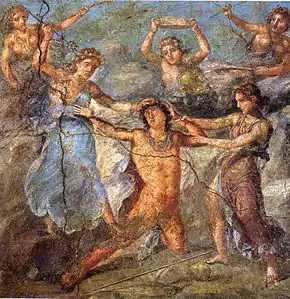Sparagmos
Sparagmos (Ancient Greek: σπαραγμός, from σπαράσσω sparasso, "tear, rend, pull to pieces") is an act of rending, tearing apart, or mangling,[1] usually in a Dionysian context.

In Dionysian rite as represented in myth and literature, a living animal, or sometimes even a human being, is sacrificed by being dismembered. Sparagmos was frequently followed by omophagia (the eating of the raw flesh of the one dismembered). It is associated with the Maenads or Bacchantes, followers of Dionysus, and the Dionysian Mysteries. Historically, however, there is little indication that women celebrating the rites of Dionysus dismembered animals or ate raw flesh.[2]
Examples of sparagmos appear in Euripides's play The Bacchae. In one scene guards sent to control the Maenads witness them pulling a live bull to pieces with their hands. Later, after King Pentheus has banned the worship of Dionysus, the god lures him into a forest, to be torn limb from limb by Maenads, including his own mother Agave. According to some myths, Orpheus, regarded as a prophet of Orphic or Bacchic religion, died when he was dismembered by raging Thracian women.
Medea
Medea is said to have killed and dismembered her brother whilst fleeing with Jason and the stolen fleece in order to delay their pursuers, who would be compelled to collect the remains of the prince for burial. The Italian film director Pier Paolo Pasolini staged a sparagmos ritual as part of a long sequence near the beginning of his film Medea (1969), before dramatising the episode in which Medea kills her brother in a similar way.
Modern literature and theory
Interpreting the ritual through the lens of the Freudian Oedipus complex, Catherine Maxwell identifies sparagmos as a form of castration, particularly in the case of Orpheus.[3]
In contemporary literature, this is used in Tennessee Williams's play Suddenly, Last Summer.
Sparagmos is also briefly mentioned in Donna Tartt's The Secret History.
Sparagmos is a central theme in Dimitris Lyacos's The First Death recounting the torments of a mutilated protagonist stranded on an island. The book draws upon the dismemberment of Dionysus as well as ancient Greek rituals and practices.[4]
References
- Bruce Lincoln, Death, War, and Sacrifice: Studies in Ideology and Practice (University of Chicago Press, 1991), p. 186.
- Matthew Dillon, Girls and Women in Classical Greek Religion (Routledge, 2002), pp. 142–143.
- Catherine Maxwell, The Female Sublime from Milton to Swinburne: Bearing Blindness, Manchester University Press, 2001, p. 17
- The Journal of Modern Greek Studies,Volume 19, 2001/ Johns Hopkins University Press. Robert Zaller - Recent Translations from Shoestring Press. Tassos Denegris, Dimitris Lyacos, Dionysios Solomos. Jump up ^